
Laiyuan Mixiniu Entertainment
Wen | Xiaofu
"bad luck!"
Just one day after boarding Netflix, the douban score of Curse dropped from 8.0 to 6.8.
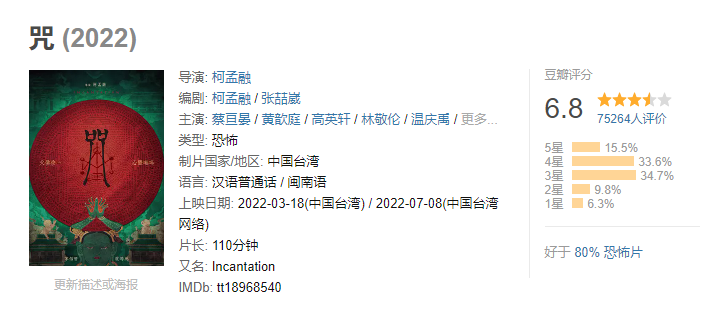
Unexpectedly, this China Taiwan Province horror film, which has been expected by mainland fans for more than a year, will cause such a strong controversy after webcasting.
However, the emergence of this word-of-mouth differentiation stems from the gap between some viewers’ expectations of the film content, and on the other hand, many viewers are disgusted with the psychological suggestion "teasing" implanted by the director in the film.
Is there anything wrong with the "curse"?
Hot search on "unlucky"
Curse is definitely the most watched Chinese horror film in recent two years.
Whether it’s the horror trailer that was once complained by netizens last year, or the numerous hot debates during the box office and release of the highest Chinese film in Taiwan Province, China this year with NT$ 171 million, this film has created so many records that people can’t ignore its existence.
Especially in the increasingly rare Chinese horror movies, Curse is the uncrowned king of Chinese horror movies in 2022.
However, on the other hand, the huge controversy after the webcast of The Curse obviously exceeded many people’s expectations.
In fact, before the official webcast, "Curse" was almost a good comment on the Douban platform. The score is 8.0, and the highest is 8.2-this is rare in Chinese horror movies.
However, last weekend, this film ushered in an unexpected word-of-mouth diving. In addition to the sharp drop in Douban score, there are many similar comments of "Forwarding likes to get unlucky" in the comments area, and even the term # curse unlucky # was once listed in Weibo hot search.

The audience has the freedom to comment on a film, just like the "unlucky" controversy in "The Curse" has also attracted new debates among the audience. Some viewers insist that it is willful and even offensive to curse the audience with movies, and whether the audience is religious or not, they will feel uncomfortable. Of course, there are also many viewers who are not too touched by the content of the film. In their view, The Curse is no different from many similar works, just an ordinary horror film.
However, we found that diving with Douban score seems not unusual, because the score of "Curse" on China Taiwan Province Yahoo is only 3.3 (out of 5.0). According to the ten-point system of Douban, mainland netizens are more tolerant.
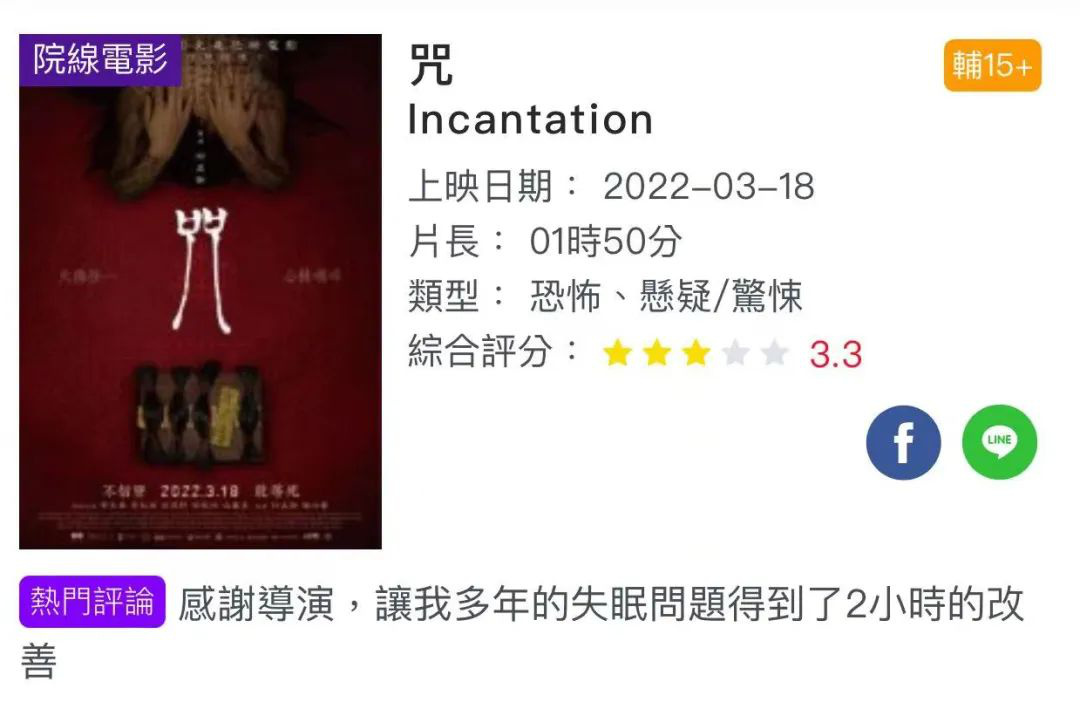
Rhinoceros Jun briefly browsed some bad reviews from the audience in Taiwan Province, China, and most of them focused on the aspects of drama routines, not terror, swaying mirrors and so on. In contrast, mainland netizens have a higher degree of recognition of the film’s plays, and more people give this film a low score because of "bad luck".
Yes, the director won.
In fact, only by looking at the content level, the setting of "The Curse" is not novel. Simply summarized, it is a horror family film shot by mockumentary. As a witness of the original event, 80% of the heroine Li Ruonan’s actions in the film are to escape from the curse and contend with it, but in the end, maternal love makes her a devotee who dares to face the horror.
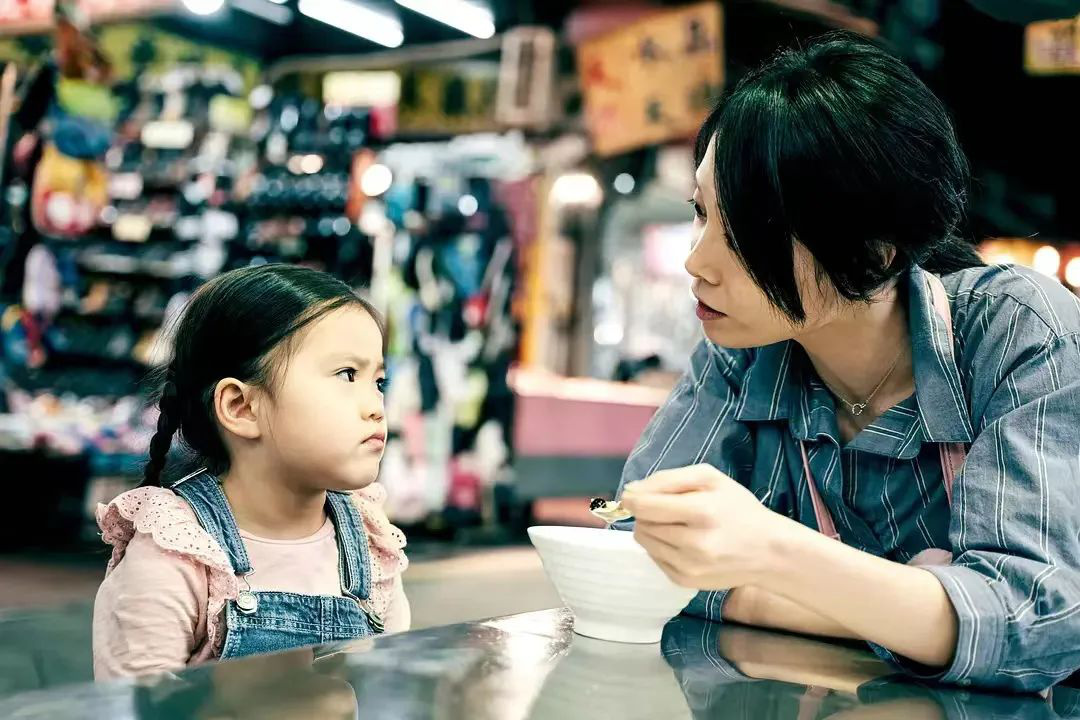
The beauty of "The Curse" is that it retains full interactivity besides the plot. If you pay close attention, it is not difficult to find that the director has been constantly breaking the fourth wall in the whole film, maintaining interaction with the audience in front of the screen, thus achieving the purpose of burying psychological hints.
For example, at the beginning, the film starts a mental experiment with the audience with the first-person dialogue of the heroine. Li Ruonan introduced to the audience two pictures of "Ferris wheel" and "train", which can change the direction with ideas, to prove that human will can change the world.
The following story mainly tells Li Ruonan’s experience in the form of mockumentary. In front of the camera, Li Ruonan’s self-report, reality and the past three story lines alternately advanced, stripping away the truth of the Chenjiazhuang incident step by step.
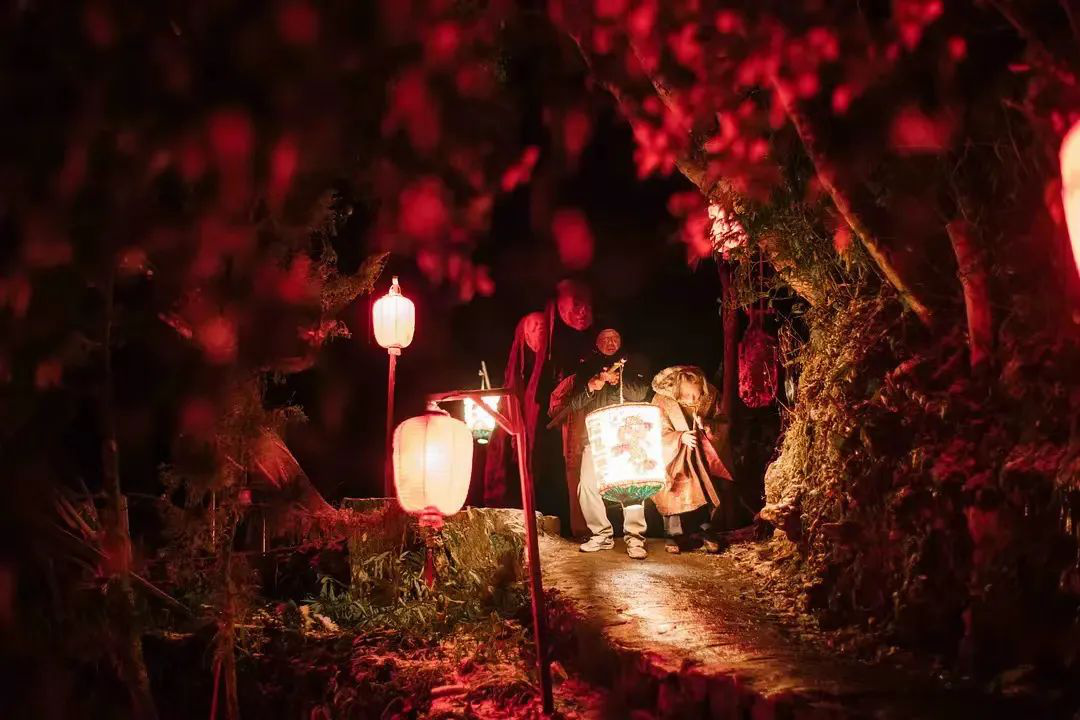
First of all, the form of mockumentary itself can enhance the realism of the story, especially Li Ruonan’s first-person narration, which invisibly gives the audience a stronger sense of substitution.
Secondly, in this film, the director also borrowed the production mode of desktop movies many times. For example, through broadcast monitoring, online video, local video and other forms, it is also to let the audience get a stronger immersive feeling.
The most important point is that the director has always used Li Ruonan’s mouth to instill the content of the fictional "Big Black Buddha Mother" Sect in the film. Strange spell symbols, strange handprints, and the unintelligible eight-character mantra of "Fire Buddha repairs one, and the heart is humming", in the process of Li Ruonan calling on everyone to remember these information, the audience has unconsciously entered the director’s small trap.
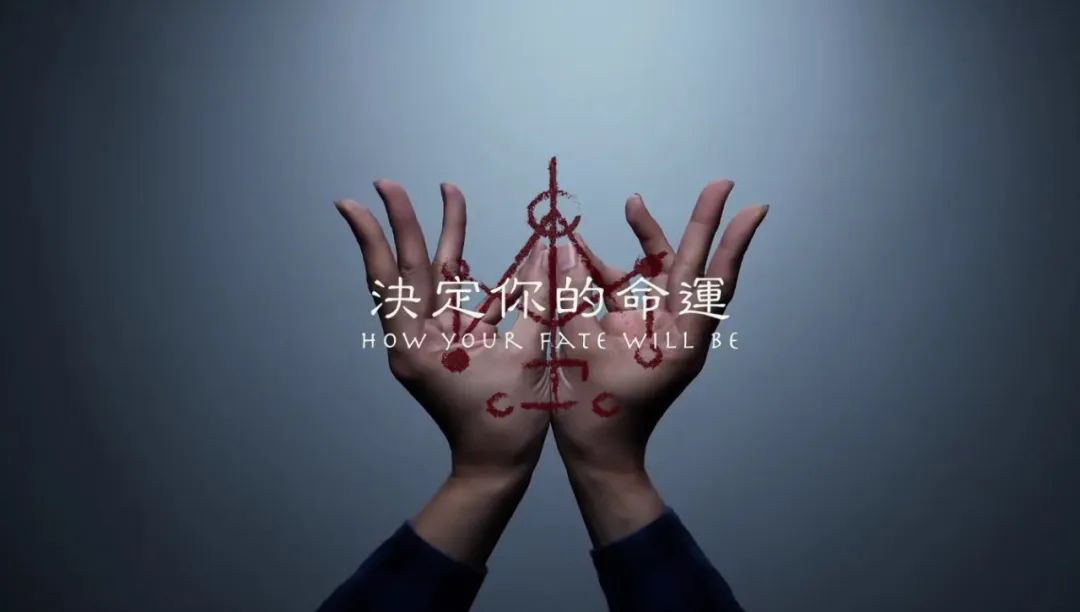
Finally, after the truth of "The Curse" came out, the audience who knew that they had been cheated or even "cursed" by the director would have such a strong feeling of truth.
And all this, is the initiator of this "practical joke", given by director Kevin Ko.
Chinese horror films worthy of being written in film history
China audience can get such an immersive viewing experience, which is inseparable from the "tailor-made" of this film. In our opinion, the fear of the curse stems from three key points.
One is religion.
As early as a few years ago, director Kevin Ko said in the program that "we Chinese people will always have awe of religion."
In daily life, people believe in gods and buddhas and are afraid of ghosts, but if gods and buddhas no longer represent justice and ghosts start to act recklessly, it becomes an excellent material for Chinese thrillers. Domestic horror games, such as Fireworks, Paper Wedding Clothes, Paper Man and Hong Kong Mystery Record, which were released in China in recent years, actually borrowed religious elements from traditional culture.

In the film "Curse", the director who knows his way also focuses on the religious color. It costs a lot of money to order Buddha statues, make props and design scenes, so we can see that most of the horror colors in the film actually come from the sense of horror created by elements such as evil spirits and scriptures, rather than the direct attack of ghosts. This is also the biggest difference between Chinese horror movies and western horror movies.
The second is the event basis.
"The Curse" may be a rare work adapted from a real event in a horror film, and the original case of this film is a bizarre case that is still pending.
In 2005, a long-time superstitious family of six in Gushan District of Kaohsiung claimed to be possessed by gods, and successively went insane, self-mutilated, fought with each other, and even fed each other feces. The eldest daughter, who was identified as an evil spirit, was eventually imprisoned and abused by the whole family to death. Because the incident was so bizarre, after the police arrested them, the doctor decided that they were collective paranoia.
Cold cases like this are hotbeds of paranormal fear of urban legends, and the curse derived from it naturally has a natural sense of terror. It is reported that director Kevin Ko will continue to create new horror films inspired by paranormal, a real horror in the history of Taiwan Province Province.
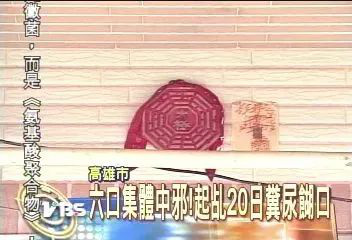
The third is the mature horror film technique.
In addition to the above-mentioned desktop movies and the form of mockumentary, JumpsScare, which can bring the most direct sensory stimulation to the audience, is also skillfully used in the film. In addition, the insects, wounds, seals, spells and other elements that appear many times in the film, as well as the empty fingers and lotus milk that once spread widely on the Internet in Jane Eyre, are very typical fears of China audiences. The director can be said to have learned from others.
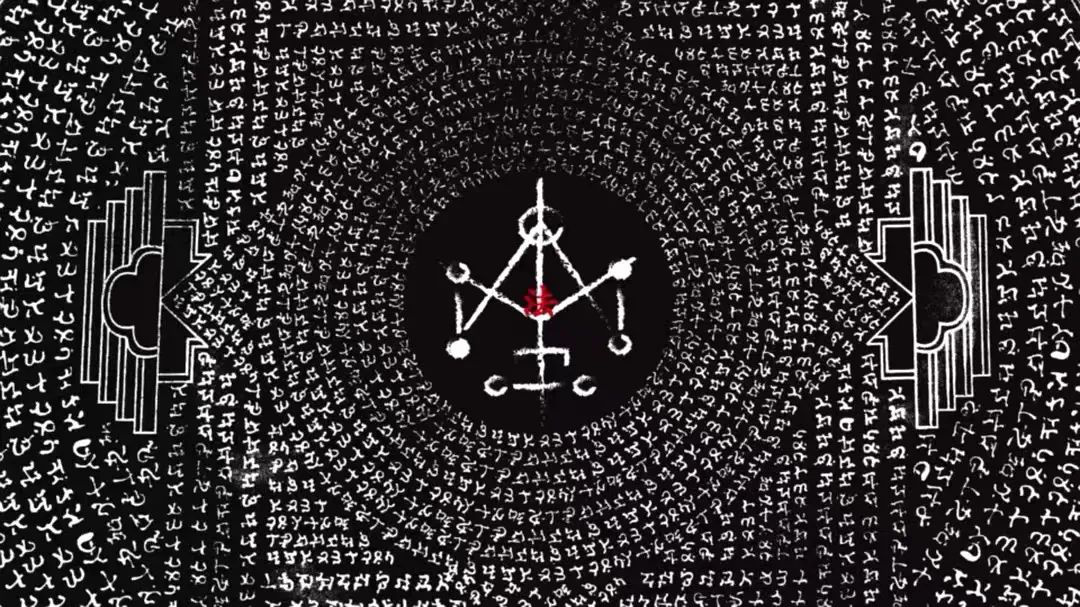
Of course, The Curse is not without flaws. For example, the distortion caused by frequent switching of different perspectives on the mirror and the discomfort of hand-held camera all weaken the narrative effect to some extent. On the whole, however, the film’s bold innovation in form and the audience’s strong feelings after watching it are doomed to be a horror film written in the history of Chinese film.
As for the climax of the film controversy, that is, the curse at the end, in fact, it is not uncommon in the field of horror films. In the past, classic horror films such as Curse and Ring at Midnight used similar techniques. The fact that "The Curse" can cause such a big controversy shows that it has completely hit the fear and taboo points of China audience.
Even when watching the movie in a non-big-screen scene, the fictional plot of this film still caused many viewers’ disgust and even discomfort. I think the director’s goal of shooting this film has been achieved. It is precisely because of this that we have more reason to think that Curse is a successful Chinese horror film.
As for raising the content of the film to a realistic level, or even reprimanding the director, I am afraid it will not be.
As many netizens said, "Do they watch horror movies for good luck?"
(